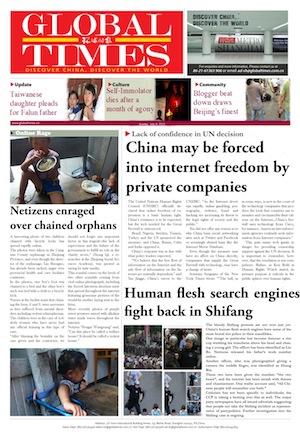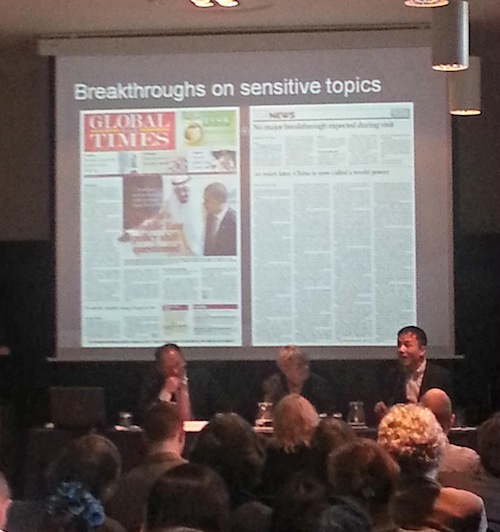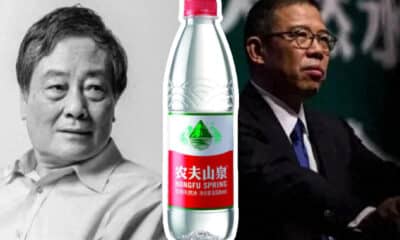Backgrounder
Behind the Headlines: China’s Media Landscape (Liveblog)
Live blog on the The Hague Conference on the Chinese Media on May 15th, at the Netherlands Institute of International Relations, Clingendael.
Published
10 years agoon
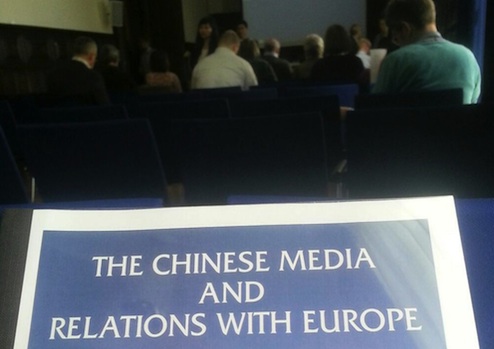
Conference on The Chinese Media and Relations with Europe
Date: May 15, 2014.
Place: The Hague, Clingendael Institute
By: Dutch think tank Clingendael and the Modern East Asia Research Centre (MEARC)
Blogged by: Manya Koetse
What’s going on behind China’s headlines? How have the dramatic reforms in China over the past decades impacted China’s media landscape? And how relevant are these changes for Europe’s perspective on China? These are questions that will be addressed at this event. Today’s conference will give a view on China’s current media landscape and the practice of journalism in the PRC. Check out any updates on the conference on this page (Don’t forget to ‘refresh’ the page every now and then by clearing the cache – something new should come up every 30 minutes). Update: live-blog now closed. See the full report below:
Chinese Media in Europe and Media Dialogues (Session One)
10:50-12:45
Chair:
Jan Melissen (Clingendael Insititute)
Speakers:
Vincent Ni (BBC World Service)
Wang Bei (Radio Netherlands Worldwide)
Pal Nyiti (Vrije Universiteit Amsterdam)
Discussant:
Odila Triebel (Institut für Auslandsbeziehungen)
11:00
“Chinese journalists are lagging behind on their international colleagues when it comes down to media coverage on Europe”, says Vincent Ni, Multimedia Producer at the BBC Chinese, BBC World Service. There are multiple factors that affect the way Chinese are ‘doing’ journalism on Europe. There are practical issues, such as language barriers, but there are also flaws in the journalistic system and attitudes towards Europe. Ni explains how some Chinese journalists have the idea that European news is just “not that exciting”, making many Chinese people working in the media industry think that American news is just more interesting and important. One factor that might contribute to this idea is that many Chinese journalists have a lack of understanding on how European government systems work and what the EU actually does. There are things that journalists on the European side can do to help Chinese media institutes, but eventually, Chinese media institutes should make a collaborate effort to educate journalists on Europe and its economic and political background. All in all, “Europe deserves more attention from Chinese press,” Ni concludes.
“How does one ‘sell’ news on Europe to a Chinese audience that thinks European news is just ‘not so exciting?'”
“Our audience is picky about news,” says Bei Wang, Chief Editor at the China Desk Radio Netherlands Worldwide (RNW). That is why RNW works in a way that is appealing to its (young) audience; not just ‘story-telling’ but ‘experience-telling’. RNW does this by using personal stories that give a different perspective on news. Currently, Chinese state media is expanding its presence in the world. They are presenting China to the world, but are also presenting the rest of the world to China. But the information they are giving is limited- there is a lack of authentic and unpolished information about Europe in Chinese language. Although China does need it, Wang agrees with Vincent Ni that news on Europe just does not ‘sell’ as well as news on, for example, America. So how does one ‘sell’ news on countries such as the Netherlands to a Chinese audience? By telling them the stories they are interested in. This is why RNW focuses on personal stories and social issues. If the Chinese audience is interested in Dutch healthcare or welfare, then this is the kind of news RNW will bring them.
Pal Nyiri is currently writing a book on Chinese correspondents abroad. Pal talks about Chinese media correspondents in Europe, their backgrounds and news focus. It is clear that the presence of Chinese journalists in the worlds is on a dramatic rise. Nyiri lays out the numbers: People’s Daily currently has about 70 overseas bureaus , Xinghua News has 140 international offices and CCTV has 70 foreign locations. China’s media bureaus have many European correspondents (some freelancing), and they struggle with a major challenge: how to make European news interesting to China. What one generally sees happening in the news is that Chinese journalists approach Europe as an exotic place where people enjoy life. ‘How the Dutch ride their bike’ would be a quite funny but realistic example of a Chinese news report on Europe. Due to various circumstances, such as relatively low wages, foreign postings are not as attractive to Chinese journalists as working within the Mainland- this is why many foreign correspondents are rather young. Through their deliverance on the news, a new picture of Europe is emerging in China. What one sees currently happening is that whatever is the news of the day within China, will be the news that is brought on Europe. Issues of environment, welfare and society are particularly popular- these news items are used as a foil to reflect back on what is going on in China.
“Chinese international media are not truly international- there is always a Chinese angle to global news.”
During the after-discussion of this first part of the conference, that has focused on Chinese media in and on Europe, Vincent Ni of the BBC expresses his critique of Chinese international media. “There is not one Chinese official media that is truly international,” he says: “Global news is consumed by a global audience. What Chinese media does, is giving a Chinese angle to international news. This is why my current job at BBC is so different from my previous job at Caixin News. At BBC, we are actually reporting news on the world, to the world.”
One discussant from the audience remarks that this part of the conference has discussed Chinese correspondents abroad and international news in China, but where is the narrative on the foreign correspondents working in China?
Journalist and researcher Garrie van Pinxteren remarks that the situation for foreign correspondents working in China is getting harder. Not only because of practical issues, such as visa, but also because more Western media are now also working with Chinese correspondents to report from within China, instead of using foreign correspondents working from China.
“In China, I hardly see newspapers, and I only see people playing games online [and not reading the news], so where is all this news actually going?!”
Another discussant from the audience, Frank Kouwenhoven from Chime Foundation, remarks that if one visits China, one hardly sees any newspapers at all. Upon entering an internet cafe, everybody seems to be playing games. So, the discussant asks, “Where is all this news we have been talking about actually going?”
“There are readers, and there will always be,” says Bei Wang from China Desk Radio Netherlands Worlwide: “Chinese citizens are actually bombarded with news every day, and there are always consumers. Think about social media such as Weibo or Weixin (Wechat)- people are increasingly sharing news through social media. The audience is getting more versatile, and so are the ways in which the news is brought to them.”
12:50 update: Time for lunch break, will keep you posted again after 13.30.
The State of Chinese Journalism Today (Session Two)
13:30-15:00
Chair:
Jan Melissen (Clingendael Insititute)
Speakers:
Hugo de Burgh (University of Westminster)
Florian Schneider (Leiden University)
Daniela Stockman (Leiden University)
13:40
How can we explain the Chinese media? Hugo de Burgh, director of the China Media Centre and writer on investigative journalism (specializing in Chinese affairs), remarks how Chinese journalism is often perceived negatively by the English-speaking world. “It is as if there are two types of investigative journalism”, he says: “The Western and the Chinese way.” But according to De Burgh, there are in fact many things the West can learn from Chinese media. Anglophones often demonize Chinese media for various biased reasons. According to De Burgh, Chinese media is actually not a ‘flawed’ edition within some universal media system. “There is no such thing as Western media,” he says. It is not an issue of Chinese media versus Western media, but more so an issue of anglophone media versus non-English media. Chinese media actually have a lot in common with other non-English media. It is useful to make comparisons between the media from different countries- but not when it is continuously approaching the other media form (in this case: Chinese media) in a biased way. Not everything is awful in the Western media, says De Burgh, neither is everything about Chinese media positive. It is about making a more honest balance in the study or critique of the state of Chinese journalism. The best framework for approaching Chinese media? It is a simple “respect for differences”.
14:00
“Chinese Media – it’s not just a simple narrative, there is an entire network of actors that collaboratively determine the dynamics of Chinese media today.”
Florian Schneider, lecturer of Politics of Modern China at Leiden University and editor of Politics East Asia stresses that there is indeed a lot of bias when talking about Chinese media. There are many people who think that the political control over Chinese journalists is so strong that they are nothing more than a mouthpiece for Xi Jinping and the Party. This is not the case, Schneider says. It makes more sense to talk about what is happening in China in the form of governance from the Party to state vis-à-vis society, and the private actors that also influence China’s cultural sphere. Schneider shows that the discourse of the state of Chinese journalism is complex, and approaching this subject in a ‘political control’ framework is not only biased, but also far too narrow. “People assume it’s a simple narrative,” Schneider says, but leave out all the dynamics that contribute to the state of journalism in China today. Within journalism, there are now a myriad of players besides the State; think of companies as Sina News or Baidu, that have greatly influenced China’s mass communication. Schneider advocates for a change in how we think about Chinese media. There is more than the Party and the State- there is an entire network of actors that collaboratively determine the dynamics of Chinese media today.
14:20
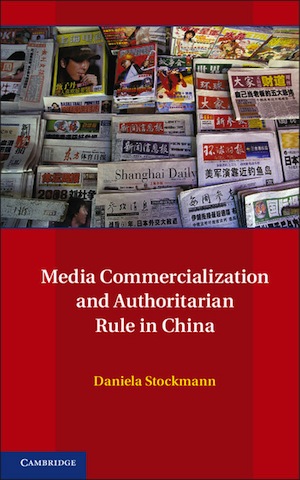
Daniela Stockman, writer of Media Commercialization and Authoritarian Rule in China, addresses the question of how Chinese media fits in the political system of today’s China. Stockman does not believe in a one-way state-to-society power relation. Instead, she argues that the state and society can mutually reinforce each other, as long as the state can walk the fine line between tolerance and control – the state actually walks this line on a daily basis. There’s a myriad of examples on how Chinese government is both maximizing control while bringing about more liberalization. It is the impact of market forces in the media that contribute to this mechanism of control and liberalization, Stockman says. Media marketization has boosted the credibility of today’s journalism – because new media sources are branded in a certain way, people assume it is not propaganda and thus have more trust in these types of media. Chinese readers have a preference for ‘non-official’ papers, because they generally believe these are more credible than the ‘official’ ones. Note that Stockman says that there actually are no 100% ‘non-official’ papers, although they are addressed in this way. Stockman’s research has pointed out that ‘non official’ papers are more effective in changing people’s opinions due to their credibility, and in this way, somewhat contradictory, do help propagating authoritarian rule in China.
During the audience Q&A, Peter Gries, US-China Issues Director&Professor at University of Oklahoma, addresses his question to Hugo de Burgh, noticing that on one hand De Burgh is advocating for perceiving Chinese media in a balanced way – yet his own frame of reference in doing so is the demonization of Chinese media in the ‘western world’. “How do you escape this political space that is central to this type of discourse?” Gries asks. Another attendee talks about how this conference has stressed the anglophone ‘demonization’ of Chinese journalism, and wonders if there is also such a phenomenon as the Chinese ‘demonization’ of Western media.
15.10-15.30 break, the final session on China’s 21st century journalists will start after the break.
China’s 21st Century Journalism: A Chinese View (Keynote Session)
15:30-17:00
Chair:
Garrie van Pinxteren
Speakers:
Wu Gang (The Global Times)
Michael Anti (Blogger & Internet Journalist)
15:40
Michael Anti (also known as Zhao Jing) internet journalist and renowned Twitterer (you can follow him on @mranti), starts off the keynote session by remarking how time is the biggest problem for scholars who write on China and media. Developments in China go too fast for scholars to keep up. “The academic world should work together with bloggers,” Anti says.
“Weibo is no longer the Weibo it was. The Golden Days of Chinese social media ended in 2012.”
China’s Internet policies are getting stricter, Anti states. It has become easier for reporters and bloggers to end up in jail. Nevertheless, social media can change China to a more liberal and democratic society. “Sometimes we have freedom just because someone allows us to. When they don’t allow it- the door is closed,” says Anti. He explains that it is often allowed for netizens to criticize local governments. As long as one keeps to one rule: do not direct your criticism towards the central government. Anti calls the years up ’til 2012 the “Golden Years” of Chinese media- it was in these times (roughly from 2009-2012) that netizens enjoyed the most freedom to write what they wanted. Weibo is no longer the Weibo it once was- because of the implementation of new laws and online guidelines, people are scared to write what they want; they can be detained if the government decides their social content is not allowed. But China moves fast, Anti says, and we can now see that online movements are shifting from Weibo to Weixin (Wechat), where groups can connect and organize themselves in a more secret way. But, when netizens are quick, the government is quick to follow. Comments within the seemingly private Weixin app are already being checked by censors. This makes it harder for journalists to do their work. “My industry is dying,” Anti says. The fear for detainment (“I have a very beautiful wife”) has lead Anti to shift his focus towards international news, which is less censored by authorities.
“We are not innovative because of governmental censorship, we are innovative in spite of it.”
Anti encourages the western audience to really interact with Chinese media: “We need your support to understand China better. You should not just read China Daily. Get a Wechat account. Engage with the Chinese people. Whatever the government does, Chinese people are nice. Like me.” Ending his talk, Anti remarks the inventive nature of Chinese netizens and journalists: “We are not innovative because of governmental censorship, we are innovative in spite of it.”
16:10
Gang Wu, news editor and deputy director at the English Edition of the Global Times, talks about the development of the Global Times and the complexity of Chinese media- news editors are often walking a fine line in deciding what (not) to cover. Wu tells about an important turning point in the influence of the Global Times in China. The year 1999 was important because of the bombing of the Chinese embassy in Belgrade. The event evoked many angry reactions from Chinese citizens, who threw eggs and stones at the US consulate in Beijing. (“I would’ve thrown a stone myself,” Wu says: “But I couldn’t find any..”). Global Times thoroughly reported on the developments of the story. Following the growing circulation of the Global Times, changes have been made in reports and decisions on what to cover, and how to cover it. Wu remarks how the attention is gradually shifting towards domestic news now, which is more controversial. “Talking about domestic politics is really dangerous,” Wu states. He explains how writing about national politics, compared to covering international events, is always a tricky matter. In covering Chinese politics, the media source might be perceived as being a mouthpiece for the government, or of speaking against the government- which are both dangerous territories. Global Times does not want to speak for the government or the elite; it aims to speak for China’s mainstream audience.
The reality of Chinese media is that any media office can be closed at any time. Nevertheless, Global Times has had breakthroughs in reporting sensitive topics. Journalists have to be careful with the tone of their narratives, and sensitive news has to be taken step by step- in this way, the government, hopefully, can slowly get used to the pace of China’s current media coverage.
16:50
“Who will arrest the government?”
During the Q&A, Wu Gang addresses the difference between himself and Michael Anti when speaking of Chinese media. Wu states that Anti is more critical than him about governmental issues. Wu Gang does have the hope and the belief that Chinese media and the government can collaborate and work side by side within the Chinese media landscape. Since the government is particularly strict about the publication of so-called ‘false rumors’, Wu feels that journalists need to be especially careful that the news they bring is absolutely factual. Anti expresses his dissatisfaction with China’s law on the start of ‘false rumors’ – “what happens when the government says something which is not true,” Anti says: “Who will arrest the government?” Democracy, Anti adds, actually suits any country. There are those who say democracy is not for China. “That is racist,” Anti says: “Democracy is just as good for China as it is for any other country.”
17:10
Huub Wijfjes, Professor of Journalism Studies and Media History at the University of Groningen, takes on the closing remarks. Today we have learned that from the western view, one tends to discuss Chinese media within one’s own framework. ‘Chinese media’ is often seen as being identical to the governmental voice, and is associated with Party control. “There’s more to Chinese media,” Wijfjes says. We should look beyond propaganda and think deeper about how the Chinese media system works, without denying the fact that there is still authoritarian rule and dictatorship, deeply affecting the current landscape of Chinese media.
This live blog is now closed. For any remarks or questions, feel free to email at manya@whatsonweibo.com,
or contact the blogger through Twitter at @manyapan.
Manya Koetse is the founder and editor-in-chief of whatsonweibo.com. She is a writer, public speaker, and researcher (Sinologist, MPhil) on social trends, digital developments, and new media in an ever-changing China, with a focus on Chinese society, pop culture, and gender issues. She shares her love for hotpot on hotpotambassador.com. Contact at manya@whatsonweibo.com, or follow on Twitter.

Also Read
Backgrounder
“Oppenheimer” in China: Highlighting the Story of Qian Xuesen
Qian Xuesen is a renowned Chinese scientist whose life shares remarkable parallels with Oppenheimer’s.
Published
7 months agoon
September 16, 2023By
Zilan Qian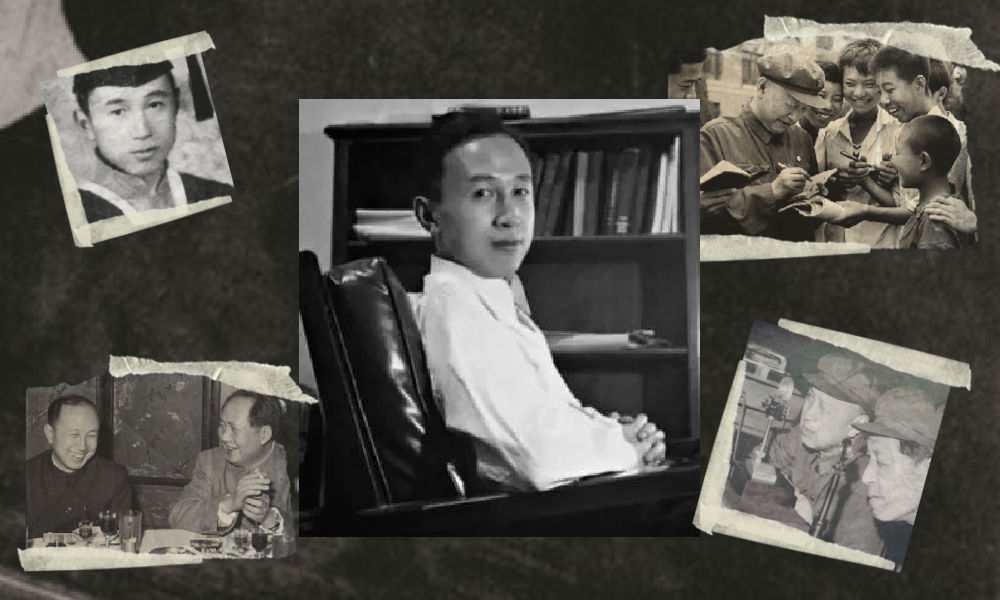
They shared the same campus, lived in the same era, and both played pivotal roles in shaping modern history while navigating the intricate interplay between science and politics. With the release of the “Oppenheimer” movie in China, the renowned Chinese scientist Qian Xuesen is being compared to the American J. Robert Oppenheimer.
In late August, the highly anticipated U.S. movie Oppenheimer finally premiered in China, shedding light on the life of the famous American theoretical physicist J. Robert Oppenheimer (1904-1967).
Besides igniting discussions about the life of this prominent scientist, the film has also reignited domestic media and public interest in Chinese scientists connected to Oppenheimer and nuclear physics.
There is one Chinese scientist whose life shares remarkable parallels with Oppenheimer’s. This is aerospace engineer and cyberneticist Qian Xuesen (钱学森, 1911-2009). Like Oppenheimer, he pursued his postgraduate studies overseas, taught at Caltech, and played a pivotal role during World War II for the US.
Qian Xuesen is so widely recognized in China that whenever I introduce myself there, I often clarify my last name by saying, “it’s the same Qian as Qian Xuesen’s,” to ensure that people get my name.
Some Chinese blogs recently compared the academic paths and scholarly contributions of the two scientists, while others highlighted the similarities in their political challenges, including the revocation of their security clearances.
The era of McCarthyism in the United States cast a shadow over Qian’s career, and, similar to Oppenheimer, he was branded as a “communist suspect.” Eventually, these political pressures forced him to return to China.
Although Qian’s return to China made his later life different from Oppenheimer’s, both scientists lived their lives navigating the complex dynamics between science and politics. Here, we provide a brief overview of the life and accomplishments of Qian Xuesen.
Departing: Going to America
Qian Xuesen (钱学森, also written as Hsue-Shen Tsien), often referred to as the “father of China’s missile and space program,” was born in Shanghai in 1911,1 a pivotal year marked by a historic revolution that brought an end to the imperial dynasty and gave rise to the Republic of China.
Much like Oppenheimer, who pursued further studies at Cambridge after completing his undergraduate education, Qian embarked on a journey to the United States following his bachelor’s studies at National Chiao Tung University (now Shanghai Jiao Tong University). He spent a year at Tsinghua University in preparation for his departure.
The year was 1935, during the eighth year of the Chinese Civil War and the fourth year of Japan’s invasion of China, setting the backdrop for his academic pursuits in a turbulent era.
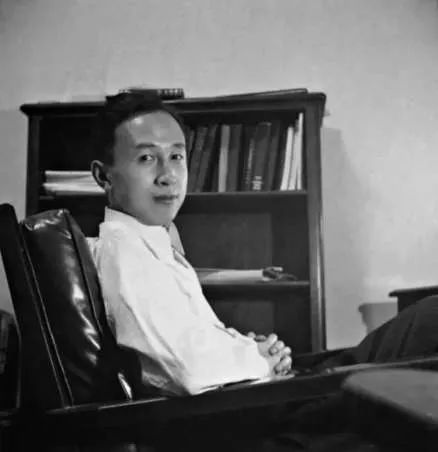
Qian in his office at Caltech (image source).
One year after arriving in the U.S., Qian earned his master’s degree in aeronautical engineering from the Massachusetts Institute of Technology (MIT). Three years later, in 1939, the 27-year-old Qian Xuesen completed his PhD at the California Institute of Technology (Caltech), the very institution where Oppenheimer had been welcomed in 1927. In 1943, Qian solidified his position in academia as an associate professor at Caltech. While at Caltech, Qian helped found NASA’s Jet Propulsion Laboratory.
When World War II began, while Oppenheimer was overseeing the Manhattan Project’s efforts to assist the U.S. in developing the atomic bomb, Qian actively supported the U.S. government. He served on the U.S. government’s Scientific Advisory Board and attained the rank of lieutenant colonel.

The first meeting of the US Department of the Air Force Scientific Advisory Board in 1946. The predecessor, the Scientific Advisory Group, was founded in 1944 to evaluate the aeronautical programs and facilities of the Axis powers of World War II. Qian can be seen standing in the back, the second on the left (image source).
After the war, Qian went to teach at MIT and returned to Caltech as a full-time professor in 1949. During that same year, Mao Zedong proclaimed the establishment of the People’s Republic of China (PRC). Just one year later, the newly-formed nation became involved in the Korean War, and China fought a bloody battle against the United States.
Red Scare: Being Labeled as a Communist
Robert Oppenheimer and Qian Xuesen both had an interest in Communism even prior to World War II, attending communist gatherings and showing sympathy towards the Communist cause.
Qian and Oppenheimer may have briefly met each other through their shared involvement in communist activities. During his time at Caltech, Qian secretly attended meetings with Frank Oppenheimer, the brother of J. Robert Oppenheimer (Monk 2013).
However, it was only after the war that their political leanings became a focal point for the FBI.
Just as the FBI accused Oppenheimer of being an agent of the Soviet Union, they quickly labeled Qian as a subversive communist, largely due to his Chinese heritage. While the government did not succeed in proving that Qian had communist ties with China during that period, they did ultimately succeed in portraying Qian as a communist affiliated with China a decade later.
During the transition from the 1940s to the 1950s, the Cold War was underway, and the anti-communist witch-hunts associated with the McCarthy era started to intensify (BBC 2020).
In 1950, the Korean War erupted, with the People’s Republic of China (PRC) joining North Korea in the conflict against South Korea, which received support from the United States. It was during this tumultuous period that the FBI officially accused Qian of communist sympathies in 1950, leading to the revocation of his security clearance despite objections from Qian’s colleagues. Four years later, in 1954, Robert Oppenheimer went through a similar process.
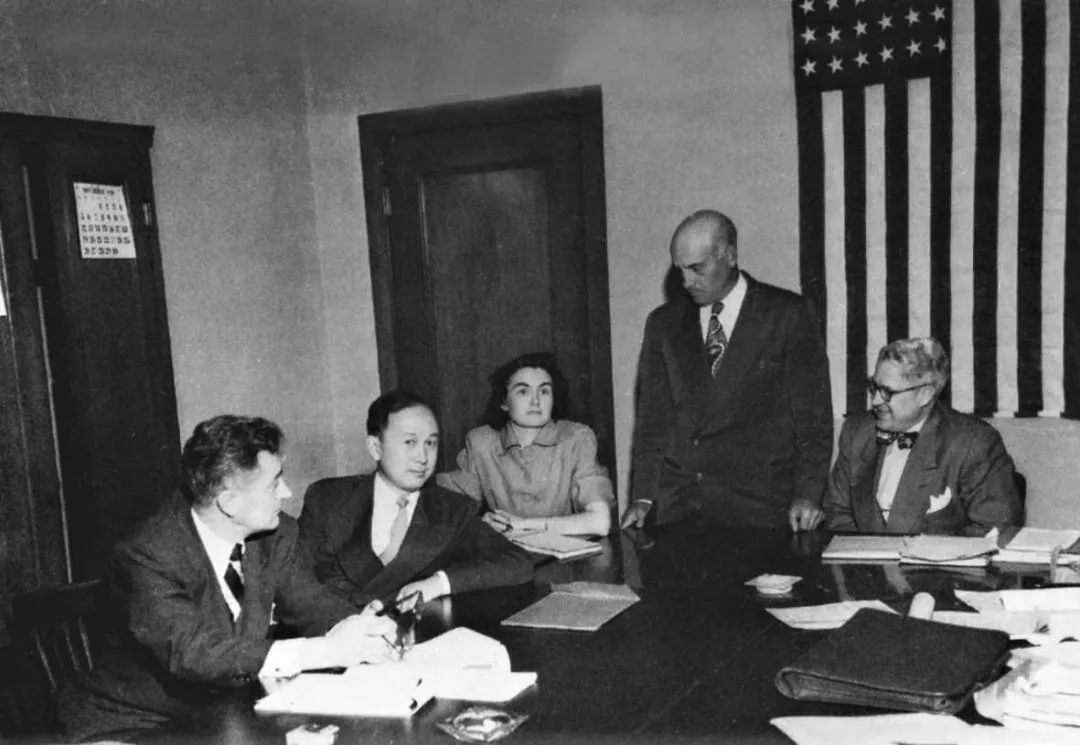
The 1950’s security hearing of Qian (second left). (Image source).
After losing his security clearance, Qian began to pack up, saying he wanted to visit his aging parents back home. Federal agents seized his luggage, which they claimed contained classified materials, and arrested him on suspicion of subversive activity. Although Qian denied any Communist leanings and rejected the accusation, he was detained by the government in California and spent the next five years under house arrest.
Five years later, in 1955, two years after the end of the Korean War, Qian was sent home to China as part of an apparent exchange for 11 American airmen who had been captured during the war. He told waiting reporters he “would never step foot in America again,” and he kept his promise (BBC 2020).
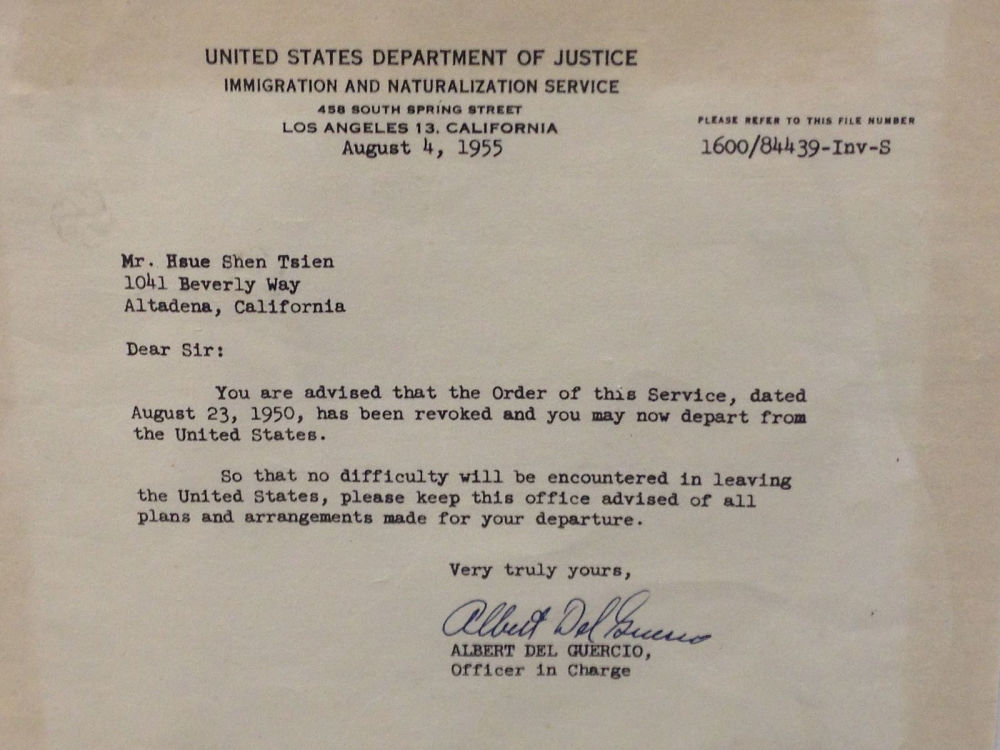
A letter from the US Immigration and Naturalization Service to Qian Xuesen, dated August 4, 1955, in which he was notified he was allowed to leave the US. The original copy is owned by Qian Xuesen Library of Shanghai Jiao Tong University, where the photo was taken. (Caption and image via wiki).
Dan Kimball, who was the Secretary of the US Navy at the time, expressed his regret about Qian’s departure, reportedly stating, “I’d rather shoot him dead than let him leave America. Wherever he goes, he equals five divisions.” He also stated: “It was the stupidest thing this country ever did. He was no more a communist than I was, and we forced him to go” (Perrett & Bradley, 2008).
Kimball may have foreseen the unfolding events accurately. After his return to China, Qian did indeed assume a pivotal role in enhancing China’s military capabilities, possibly surpassing the potency of five divisions. The missile programme that Qian helped develop in China resulted in weapons which were then fired back on America, including during the 1991 Gulf War (BBC 2020).
Returning: Becoming a National Hero
The China that Qian Xuesen had left behind was an entirely different China than the one he returned to. China, although having relatively few experts in the field, was embracing new possibilities and technologies related to rocketry and space exploration.
Within less than a month of his arrival, Qian was welcomed by the then Vice Prime Minister Chen Yi, and just four months later, he had the honor of meeting Chairman Mao himself.
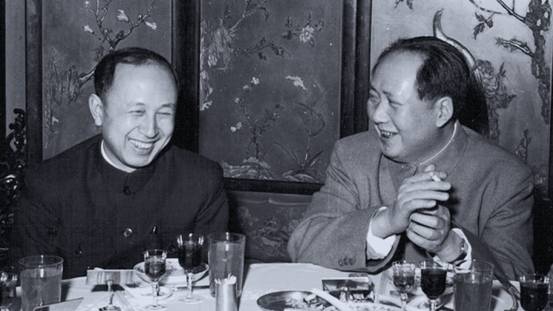
Qian and Mao (image source).
In China, Qian began a remarkably successful career in rocket science, with great support from the state. He not only assumed leadership but also earned the distinguished title of the “father” of the Chinese missile program, instrumental in equipping China with Dongfeng ballistic missiles, Silkworm anti-ship missiles, and Long March space rockets.
Additionally, his efforts laid the foundation for China’s contemporary surveillance system.
By now, Qian has become somewhat of a folk hero. His tale of returning to China despite being thwarted by the U.S. government has become like a legendary narrative in China: driven by unwavering patriotism, he willingly abandoned his overseas success, surmounted formidable challenges, and dedicated himself to his motherland.
Throughout his lifetime, Qian received numerous state medals in recognition of his work, establishing him as a nationally celebrated intellectual. From 1989 to 2001, the state-launched public movement “Learn from Qian Xuesen” was promoted throughout the country, and by 2001, when Qian turned 90, the national praise for him was on a similar level as that for Deng Xiaoping in the decade prior (Wang 2011).
Qian Xuesen remains a celebrated figure. On September 3rd of this year, a new “Qian Xuesen School” was established in Wenzhou, Zhejiang Province, becoming the sixth high school bearing the scientist’s name since the founding of the first one only a year ago.
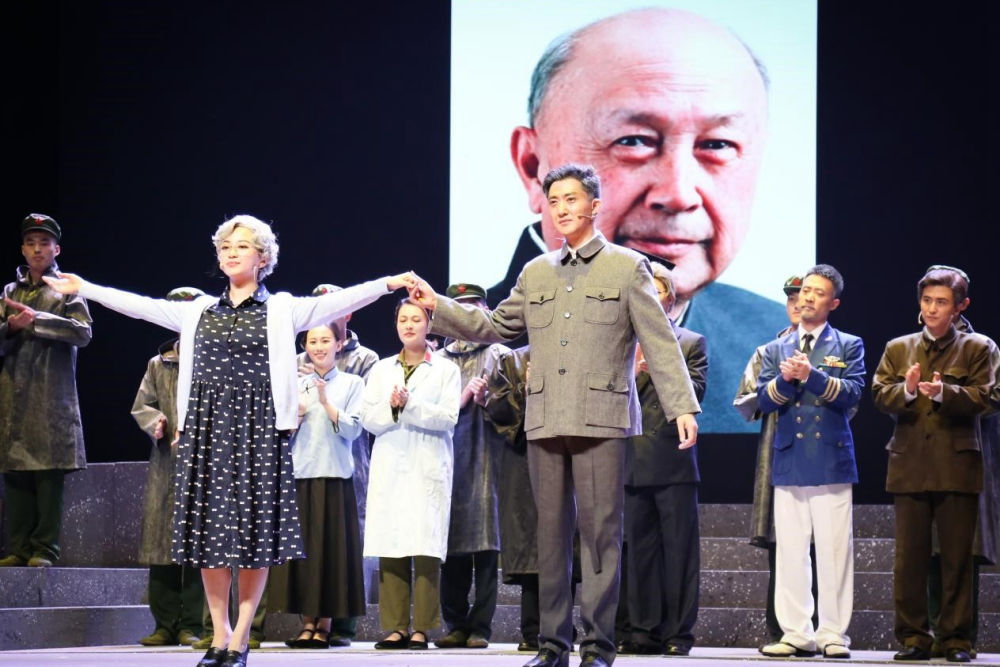
In 2017, the play “Qian Xuesen” was performed at Qian’s alma mater, Shanghai Jiaotong University. (Image source.)
Qian Xuesen’s legacy extends well beyond educational institutions. His name frequently appears in the media, including online articles, books, and other publications. There is the Qian Xuesen Library and a museum in Shanghai, containing over 70,000 artefacts related to him. Qian’s life story has also been the inspiration for a theater production and a 2012 movie titled Hsue-Shen Tsien (钱学森).2
Unanswered Questions
As is often the case when people are turned into heroes, some part of the stories are left behind while others are highlighted. This holds true for both Robert Oppenheimer and Qian Xuesen.
The Communist Party of China hailed Qian as a folk hero, aligning with their vision of a strong, patriotic nation. Many Chinese narratives avoid the debate over whether Qian’s return was linked to problems and accusations in the U.S., rather than genuine loyalty to his homeland.
In contrast, some international media have depicted Qian as a “political opportunist” who returned to China due to disillusionment with the U.S., also highlighting his criticism of “revisionist” colleagues during the Cultural Revolution and his denunciation of the 1989 student demonstrations.
Unlike the image of a resolute loyalist favored by the Chinese public, Qian’s political ideology was, in fact, not consistently aligned, and there were instances where he may have prioritized opportunity over loyalty at different stages of his life.
Qian also did not necessarily aspire to be a “flawless hero.” Upon returning to China, he declined all offers to have his biography written for him and refrained from sharing personal information with the media. Consequently, very little is known about his personal life, leaving many questions about the motivations driving him, and his true political inclinations.

The marriage photo of Qian and Jiang. (Image source).
We do know that Qian’s wife, Jiang Ying (蒋英), had a remarkable background. She was of Chinese-Japanese mixed race and was the daughter of a prominent military strategist associated with Chiang Kai-shek. Jiang Ying was also an accomplished opera singer and later became a professor of music and opera at the Central Conservatory of Music in Beijing.
Just as with Qian, there remain numerous unanswered questions surrounding Oppenheimer, including the extent of his communist sympathies and whether these sympathies indirectly assisted the Soviet Union during the Cold War.
Perhaps both scientists never imagined they would face these questions when they first decided to study physics. After all, they were scientists, not the heroes that some narratives portray them to be.
Also read:
■ Farewell to a Self-Taught Master: Remembering China’s Colorful, Bold, and Iconic Artist Huang Yongyu
■ “His Name Was Mao Anying”: Renewed Remembrance of Mao Zedong’s Son on Chinese Social Media
By Zilan Qian
Follow @whatsonweibo
1 Some sources claim that Qian was born in Hangzhou, while others say he was born in Shanghai with ancestral roots in Hangzhou.
2The Chinese character 钱 is typically romanized as “Qian” in Pinyin. However, “Tsien” is a romanization in Wu Chinese, which corresponds to the dialect spoken in the region where Qian Xuesen and his family have ancestral roots.
This article has been edited for clarity by Manya Koetse
References (other sources hyperlinked in text)
BBC. 2020. “Qian Xuesen: The man the US deported – who then helped China into space.” BBC.com, 27 October https://www.bbc.com/news/stories-54695598 [9.16.23].
Monk, Ray. 2013. Robert Oppenheimer: A Life inside the Center, First American Edition. New York: Doubleday.
Perrett, Bradley, and James R. Asker. 2008. “Person of the Year: Qian Xuesen.” Aviation Week and Space Technology 168 (1): 57-61.
Wang, Ning. 2011. “The Making of an Intellectual Hero: Chinese Narratives of Qian Xuesen.” The China Quarterly, 206, 352-371. doi:10.1017/S0305741011000300
Get the story behind the hashtag. Subscribe to What’s on Weibo here to receive our newsletter and get access to our latest articles:
Spotted a mistake or want to add something? Please let us know in comments below or email us. First-time commenters, please be patient – we will have to manually approve your comment before it appears.
©2023 Whatsonweibo. All rights reserved. Do not reproduce our content without permission – you can contact us at info@whatsonweibo.com.
Backgrounder
Farewell to a Self-Taught Master: Remembering China’s Colorful, Bold, and Iconic Artist Huang Yongyu
Renowned Chinese artist and the creator of the ‘Blue Rabbit’ zodiac stamp Huang Yongyu has passed away at the age of 98. “I’m not afraid to die. If I’m dead, you may tickle me and see if I smile.”
Published
10 months agoon
June 15, 2023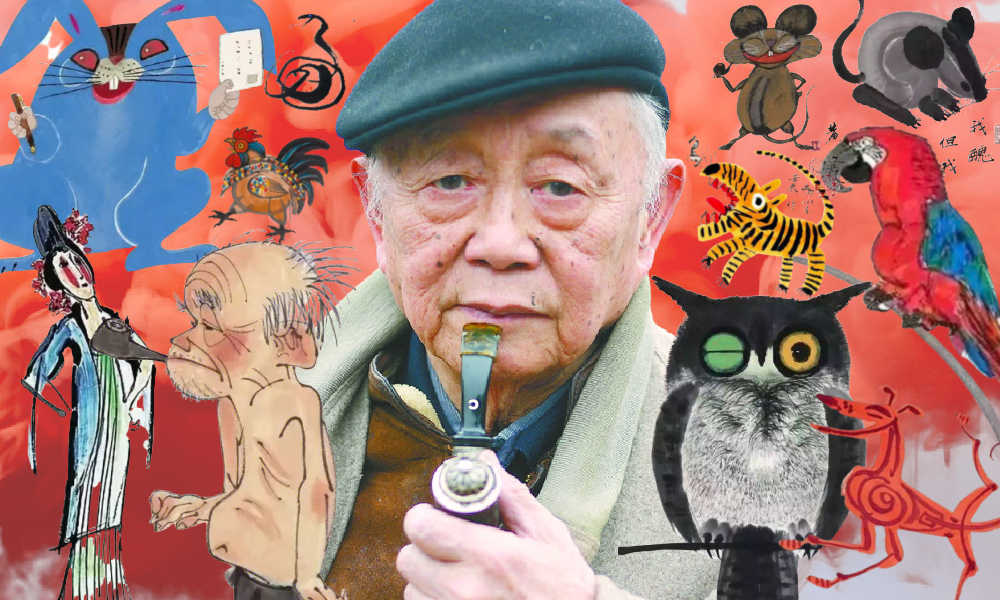
The famous Chinese painter, satirical poet, and cartoonist Huang Yongyu has passed away. Born in 1924, Huang endured war and hardship, yet never lost his zest for life. When his creativity was hindered and his work was suppressed during politically tumultuous times, he remained resilient and increased “the fun of living” by making his world more colorful.
He was a youthful optimist at old age, and will now be remembered as an immortal legend. The renowned Chinese painter and stamp designer Huang Yongyu (黄永玉) passed away on June 13 at the age of 98. His departure garnered significant attention on Chinese social media platforms this week.
On Weibo, the hashtag “Huang Yongyu Passed Away” (#黄永玉逝世#) received over 160 million views by Wednesday evening.
Huang was a member of the China National Academy of Painting (中国国家画院) as well as a Professor at the Central Academy of Fine Arts (中央美术学院).
Huang Yongyu is widely recognized in China for his notable contribution to stamp design, particularly for his iconic creation of the monkey stamp in 1980. Although he designed a second monkey stamp in 2016, the 1980 stamp holds significant historical importance as it marked the commencement of China Post’s annual tradition of releasing zodiac stamps, which have since become highly regarded and collectible items.
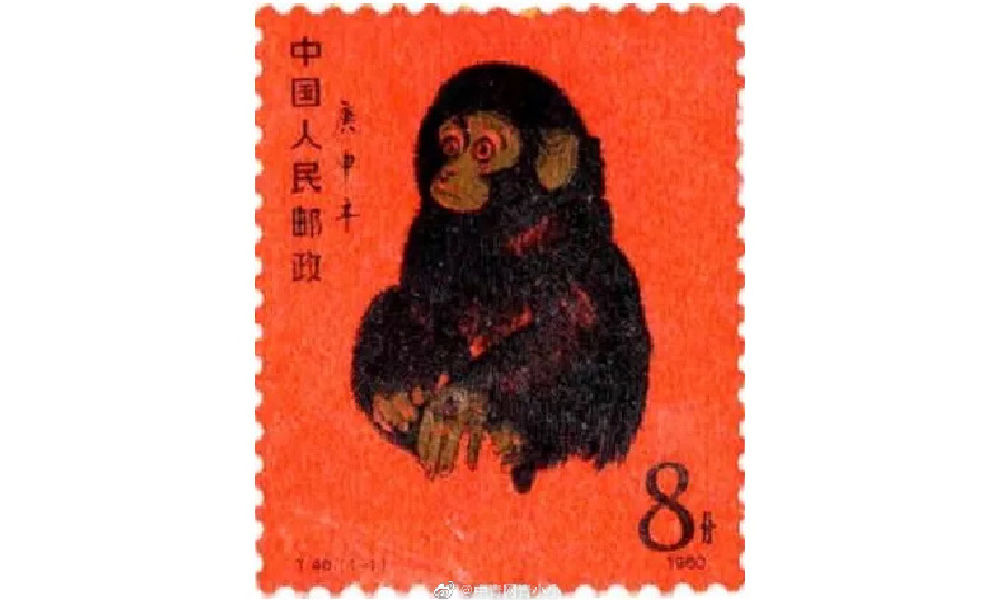
Huang’s famous money stamp that was issued by China Post in 1980.
The monkey stamp designed by Huang Yongyu has become a cherished collector’s item, even outside of China. On online marketplaces like eBay, individual stamps from this series are being sold for approximately $2000 these days.
Huang Yongyu’s latest most famous stamp was this year’s China Post zodiac stamp. The stamp, a blue rabbit with red eyes, caused some online commotion as many people thought it looked “horrific.”
Some thought the red-eyed blue rabbit looked like a rat. Others thought it looked “evil” or “monster-like.” There were also those who wondered if the blue rabbit looked so wild because it just caught Covid.
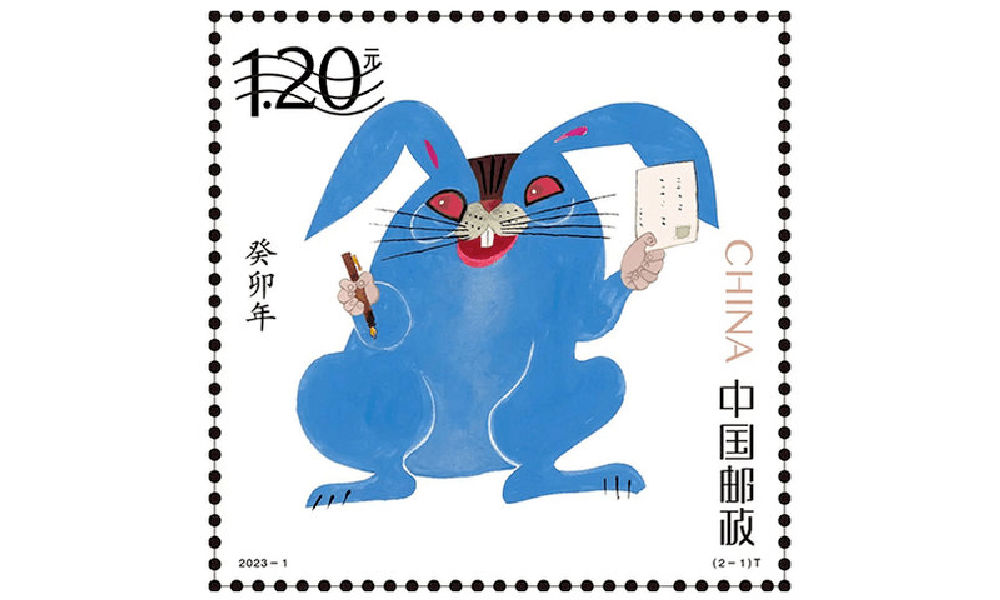
Huang’s (in)famous blue rabbit stamp.
Nevertheless, many people lined up at post offices for the stamps and they immediately sold out.
In light of the controversy, Huang Yongyu spoke about the stamps in a livestream in January of 2023. The 98-year-old artist claimed he had simply drawn the rabbit to spread joy and celebrate the new year, stating, “Painting a rabbit stamp is a happy thing. Everyone could draw my rabbit. It’s not like I’m the only one who can draw this.”
Huang’s response also went viral, with one Weibo hashtag dedicated to the topic receiving over 12 million views (#蓝兔邮票设计者直播回应争议#) at the time. Those defending Huang emphasized how it was precisely his playful, light, and unique approach to art that has made Huang’s work so famous.
A Self-Made Artist
“I’m ugly, but my mum likes me”
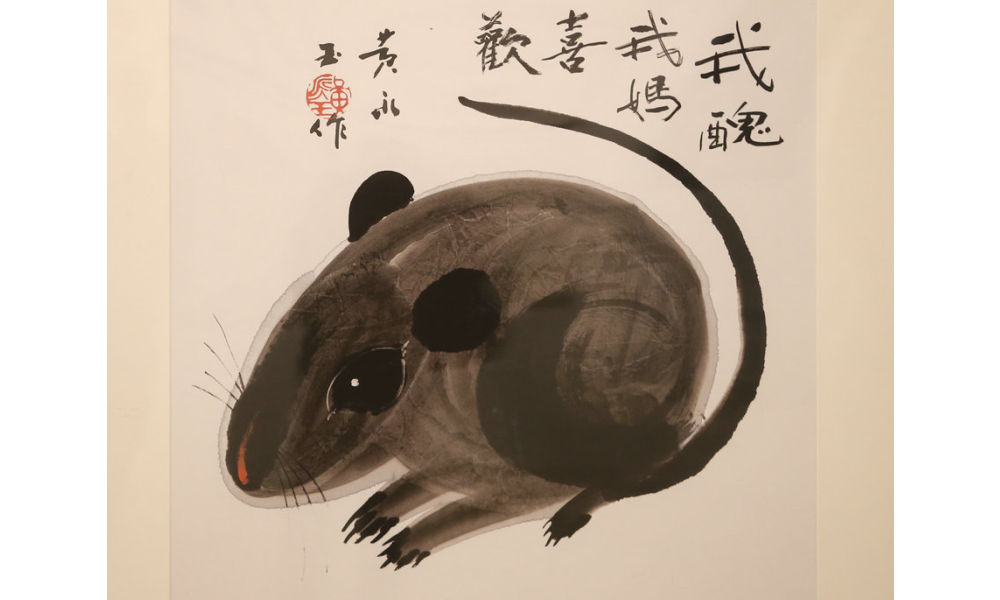
‘Ugly Mouse’ by Huang Yongyu [Image via China Daily].
Huang Yongyu was born on August 9, 1924, in Hunan’s Chengde as a native of the Tujia ethnic group.
He was born into an extraordinary family. His grandfather, Huang Jingming (黄镜铭), worked for Xiong Xiling (熊希齡), who would become the Premier of the Republic of China. His first cousin and lifelong friend was the famous Chinese novelist Shen Congwen (沈从文). Huang’s father studied music and art and was good at drawing and playing the accordion. His mother graduated from the Second Provincial Normal School and was the first woman in her county to cut her hair short and wear a short skirt (CCTV).
Born in times of unrest and poverty, Huang never went to college and was sent away to live with relatives at the age of 13. His father would die shortly after, depriving him of a final goodbye. Huang started working in various places and regions, from porcelain workshops in Dehua to artisans’ spaces in Quanzhou. At the age of 16, Huang was already earning a living as a painter and woodcutter, showcasing his talents and setting the foundation for his future artistic pursuits.
When he was 22, Huang married his first girlfriend Zhang Meixi (张梅溪), a general’s daughter, with whom he shared a love for animals. He confessed his love for her when they both found themselves in a bomb shelter after an air-raid alarm.
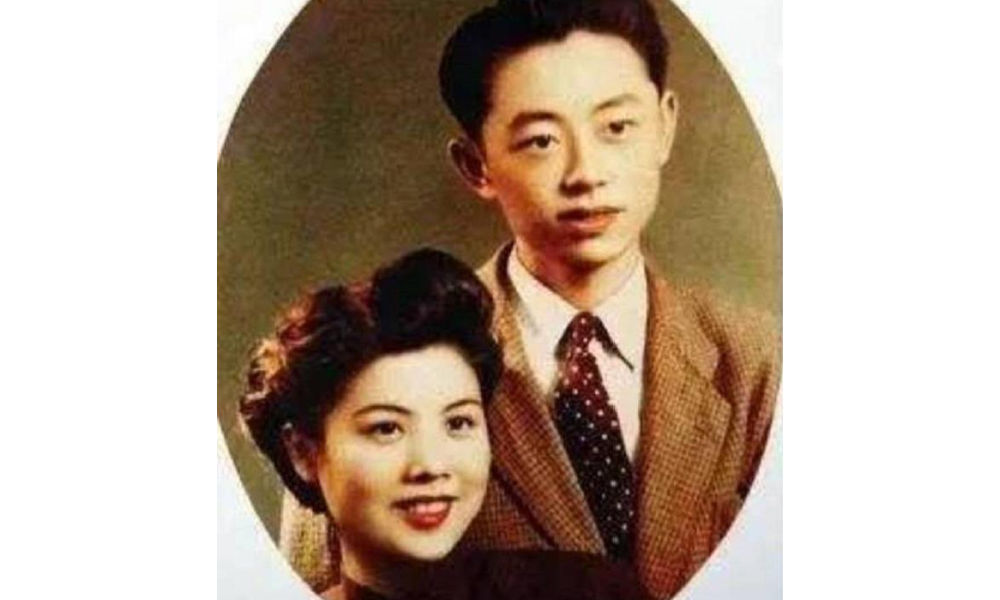
Huang and Zhang Meixi [163.com]
In his twenties, Huang Yongyu emerged as a sought-after artist in Hong Kong, where he had relocated in 1948 to evade persecution for his left-wing activities. Despite achieving success there, he heeded Shen Congwen’s advice in 1953 and moved to Beijing. Accompanied by his wife and their 7-month-old child, Huang took on a teaching position at the esteemed Central Academy of Fine Arts (中央美术学院).
The couple raised all kinds of animals at their Beijing home, from dogs and owls to turkeys and sika deers, and even monkeys and bears (Baike).
Throughout Huang’s career, animals played a significant role, not only reflecting his youthful spirit but also serving as vehicles for conveying satirical messages.
One recurring motif in his artwork was the incorporation of mice. In one of his famous works, a grey mouse is accompanied by the phrase ‘I’m ugly, but my mum likes me’ (‘我丑,但我妈喜欢’), reinforcing the notion that regardless of our outward appearance or circumstances, we remain beloved children in the eyes of our mothers.
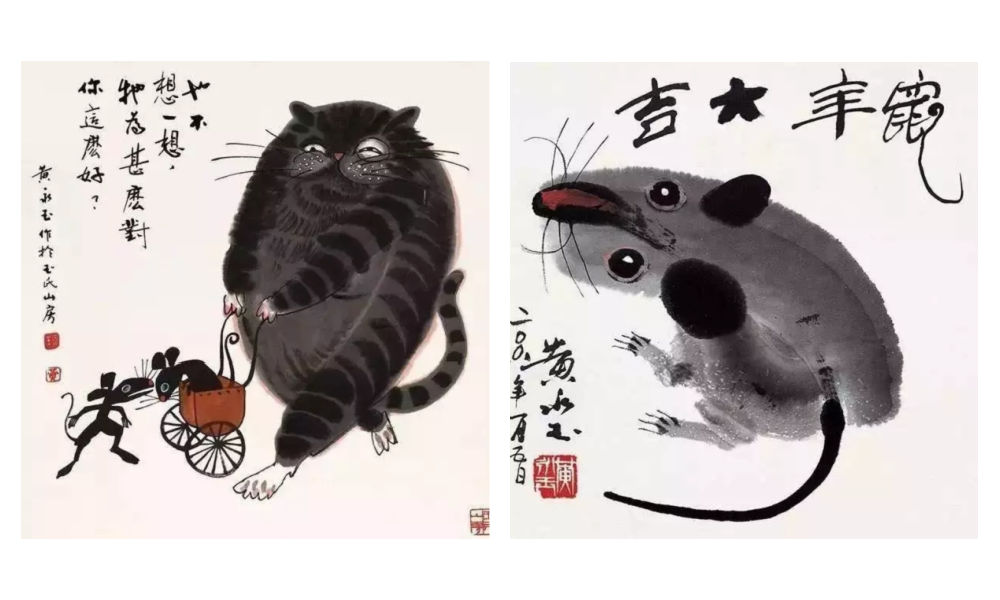
As a teacher, Huang liked to keep his lessons open-minded and he, who refused to join the Party himself, stressed the importance of art over politics. He would hold “no shirt parties” in which his all-male studio students would paint in an atmosphere of openness and camaraderie during hot summer nights (Andrews 1994, 221; Hawks 2017, 99).
By 1962, creativity in the classroom was limited and there were far more restrictions to what could and could not be created, said, and taught.
Bright Colors in Dark Times
“Strengthen my resolve and increase the fun of living”
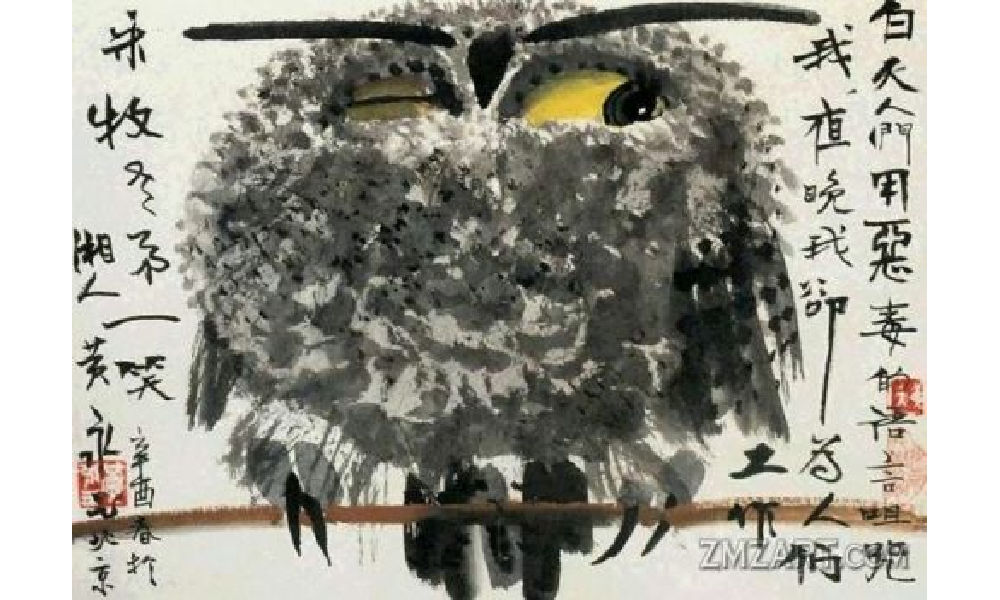
Huang Yongyu’s winking owl, 1973, via Wikiart.
In 1963, Huang was sent to the countryside as part of the “Four Cleanups” movement (四清运动, 1963-1966). Although Huang cooperated with the requirement to attend political meetings and do farm work, he distanced himself from attempts to reform his thinking. In his own time, and even during political meetings, he would continue to compose satirical and humorous pictures and captions centered around animals, which would later turn into his ‘A Can of Worms’ series (Hawks 2017, 99; see Morningsun.org).
Three years later, at the beginning of the Cultural Revolution, many Chinese major artists, including Huang, were detained in makeshift jails called ‘niupeng‘ (牛棚), cowsheds. Huang’s work was declared to be counter-revolutionary, and he was denounced and severely beaten. Despite the difficult circumstances, Huang’s humor and kindness would remind his fellow artist prisoners of the joy of daily living (2017, 95-96).
After his release, Huang and his family were relocated to a cramped room on the outskirts of Beijing. The authorities, thinking they could thwart his artistic pursuits, provided him with a shed that had only one window, which faced a neighbor’s wall. However, this limitation didn’t deter Huang. Instead, he ingeniously utilized vibrant pigments that shone brightly even in the dimly lit space.
During this time, he also decided to make himself an “extra window” by creating an oil painting titled “Eternal Window” (永远的窗户). Huang later explained that the flower blossoms in the paining were also intended to “strengthen my resolve and increase the fun of living” (Hawks 2017, 4; 100-101).
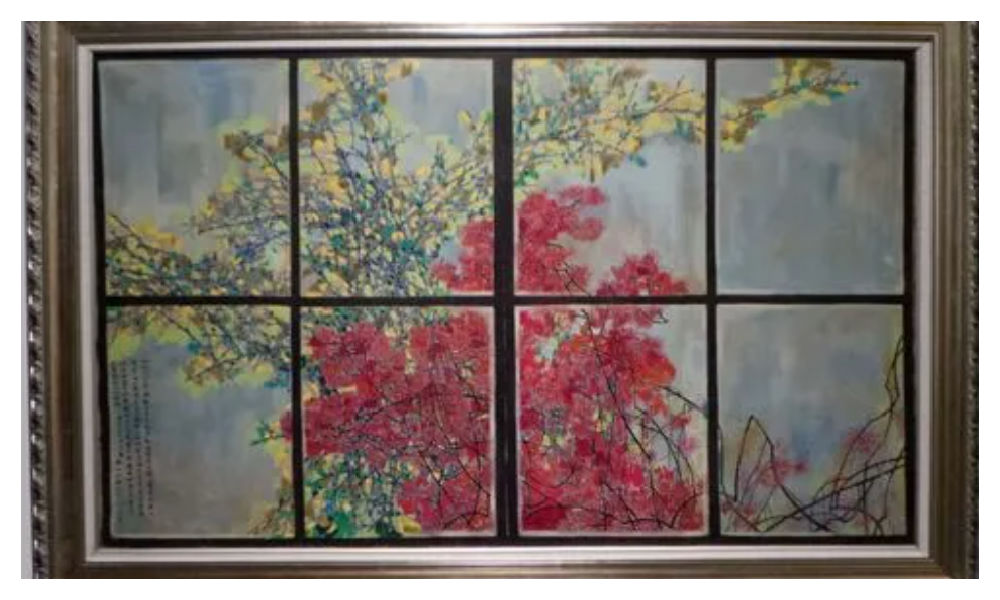
Huang Yongyu’s Eternal Window [Baidu].
In 1973, during the peak of the Cultural Revolution, Huang painted his famous winking owl. The calligraphy next to the owl reads: “During the day people curse me with vile words, but at night I work for them” (“白天人们用恶毒的语言诅咒我,夜晚我为他们工作”) (Matthysen 2021, 165).
The painting was seen as a display of animosity towards the regime, and Huang got in trouble for it. Later on in his career, however, Huang would continue to paint owls. In 1977, when the Cultural Revolution had ended, Huang Yongyu painted other owls to ridicules his former critics (2021, 174).
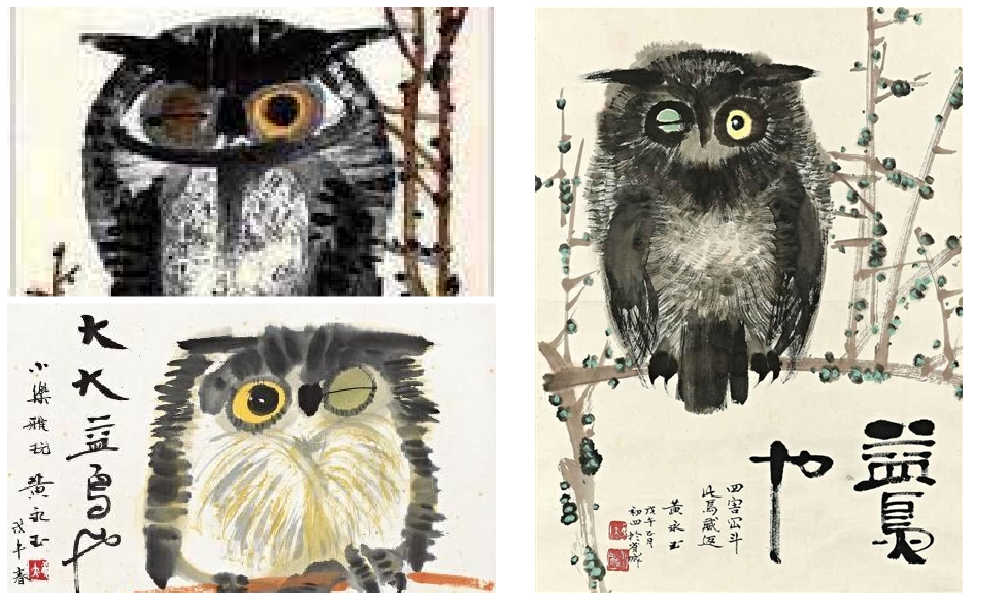
According to art scholar Shelly Drake Hawks, Huang Yongyu employed animals in his artwork to satirize the realities of life under socialism. This approach can be loosely compared to George Orwell’s famous novel Animal Farm.
However, Huang’s artistic style, vibrant personal life, and boundary-pushing work ethic also draw parallels to Picasso. Like Picasso, Huang embraced a colorful life, adopted an innovative approach to art, and challenged artistic norms.
An Optimist Despite All Hardships
“Quickly come praise me, while I’m still alive”
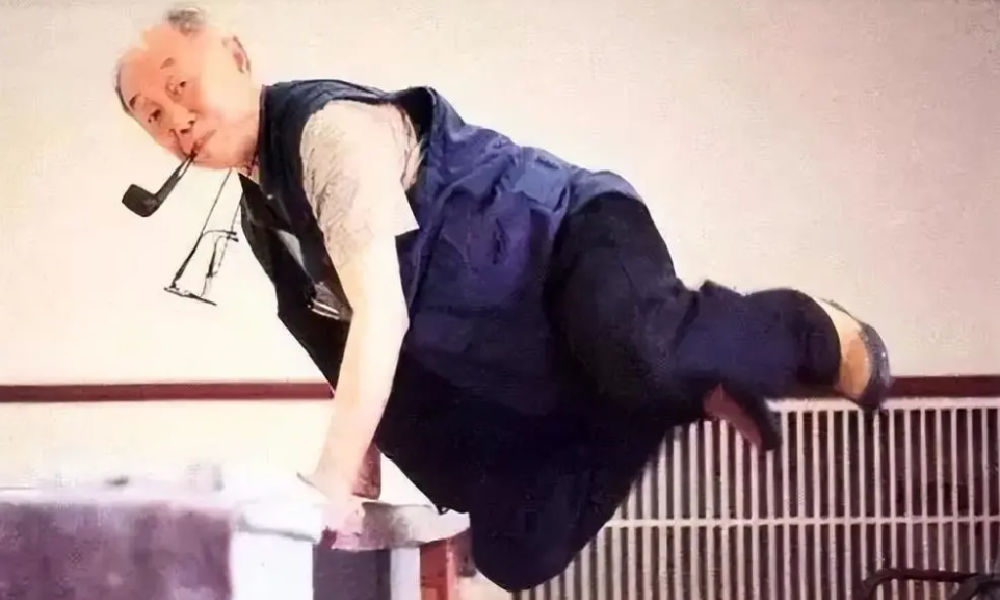
Huang Yongyu will be remembered in China with love and affection for numerous reasons. Whether it is his distinctive artwork, his mischievous smile and trademark pipe, his unwavering determination to follow his own path despite the authorities’ expectations, or his enduring love for his wife of over 75 years, there are countless aspects to appreciate and admire about Huang.
One things that is certainly admirable is how he was able to maintain a youthful and joyful attitude after suffering many hardships and losing so many friends.
“An intriguing soul. Too wonderful to describe,” one Weibo commenter wrote about Huang, sharing pictures of Huang Yongyu’s “Scenes of Pooping” (出恭图) work.
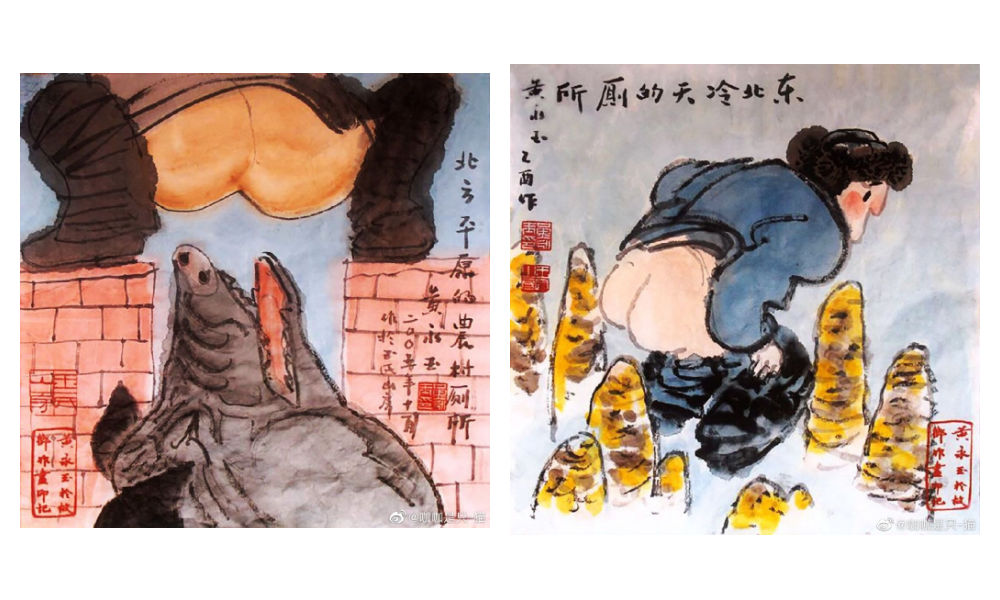
Old age did not hold him back. At the age of 70, his paintings sold for millions. When he was in his eighties, he was featured on the cover of Esquire (时尚先生) magazine.
At the age of 82, he stirred controversy in Hong Kong with his “Adam and Eve” sculpture featuring male and female genitalia, leading to complaints from some viewers. When confronted with the backlash, Huang answered, “I just wanted to have a taste of being sued, and see how the government would react” (Ora Ora).
I'm guessing the 98-year-old Huang loved the controversy. When confronted with backlash for his sculpture featuring male and female genitalia in 2007 Hong Kong, Huang answered, "I just wanted to have a taste of being sued, and see how the government would react." pic.twitter.com/kG0MVVM4SN
— Manya Koetse (@manyapan) June 15, 2023
In his nineties, he started driving a Ferrari. He owned mansions in his hometown in Hunan, in Beijing, in Hong Kong, and in Italy – all designed by himself (Chen 2019).
Huang kept working and creating until the end of his life. “It’s good to work diligently. Your work may be meaningful. Maybe it won’t be. Don’t insist on life being particularly meaningful. If it’s happy and interesting, then that’s great enough.”
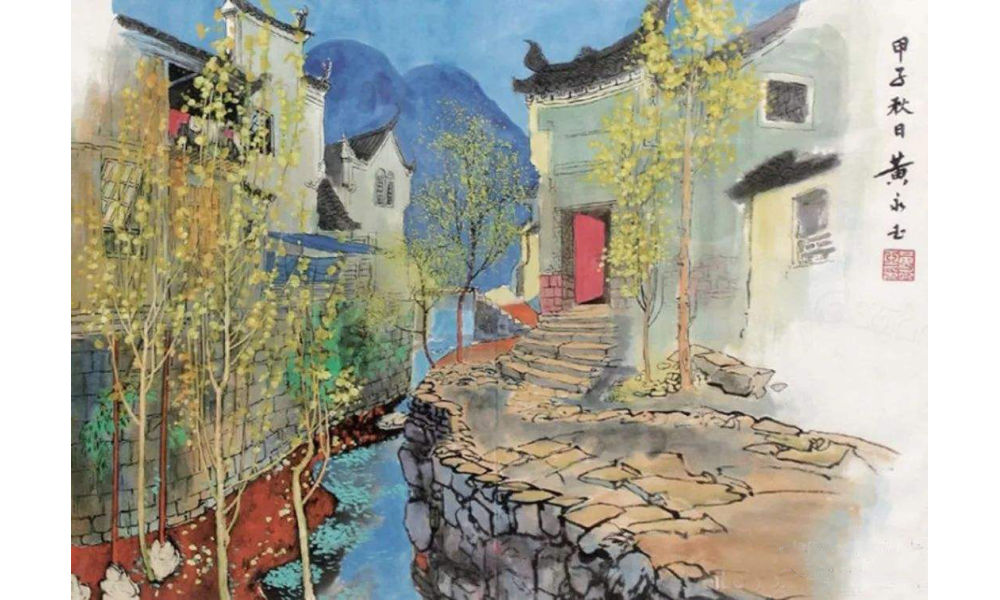
“Hometown Scenery” or rather “Hunan Scenery” (湘西风景) by Huang.
Huang did not dread the end of his life.
“My old friends have all died, I’m the only one left,” he said at the age of 95. He wrote his will early and decided he wanted a memorial service for himself before his final departure. “Quickly come praise me, while I’m still alive,” he said, envisioning himself reclining on a chair in the center of the room, “listening to how everyone applauds me” (CCTV, Sohu).
He stated: “I don’t fear death at all. I always joke that when I die, you should tickle me first and see if I’ll smile” (“对死我是一点也不畏惧,我开玩笑,我等死了之后先胳肢我一下,看我笑不笑”).

Huang with Yiwo (伊喔), the original model for the monkey stamp [Shanghai Observer].
Huang also was not sentimental about what should happen to his ashes. In a 2019 article in Guangming Daily, it was revealed that he suggested to his wife the idea of pouring his ashes into the toilet and flushing them away with the water.
However, his wife playfully retorted, saying, “No, that won’t do. Your life has been too challenging; you would clog the toilet.”
To this, Huang responded, “Then wrap my ashes into dumplings and let everyone [at the funeral] eat them, so you can tell them, ‘You’ve consumed Huang Yongyu’s ashes!'”
But she also opposed of that idea, saying that they would vomit and curse him forever.
Nevertheless, his wife expressed opposition to this idea, citing concerns that it would cause people to vomit and curse him indefinitely.
In response, Huang declared, “Then let’s forget about my ashes. If you miss me after I’m gone, just look up at the sky and the clouds.” Eventually, his wife would pass away before him, in 2020, at the age of 98, having spent 77 years together with Huang.
Huang will surely be missed. Not just by the loved ones he leaves behind, but also by millions of his fans and admirers in China and beyond.
“We will cherish your memory, Mr. Huang,” one Weibo blogger wrote. Others honor Huang by sharing some of his famous quotes, such as, “Sincerity is more important than skill, which is why birds will always sing better than humans” (“真挚比技巧重要,所以鸟总比人唱得好”).
Among thousands of other comments, another social media user bid farewell to Huang Yongyu: “Our fascinating Master has transcended. He is now a fascinating soul. We will fondly remember you.”
By Manya Koetse
Get the story behind the hashtag. Subscribe to What’s on Weibo here to receive our newsletter and get access to our latest articles:
References
Andrews, Julia Frances. 1994. Painters and Politics in the People’s Republic of China, 1949-1979. Berkley: University of California Press.
Baike. “Huang Yongyu 黄永玉.” Baidu Baike https://baike.baidu.com/item/%E9%BB%84%E6%B0%B8%E7%8E%89/1501951 [June 14, 2023].
CCTV. 2023. “Why Everyone Loves Huang Yongyu [为什么人人都爱黄永玉].” WeChat 央视网 June 14.
Chen Hongbiao 陈洪标. 2019. “Most Spicy Artist: Featured in a Magazine at 80, Flirting with Lin Qingxia at 91, Playing with Cars at 95, Wants Memorial Service While Still Alive [最骚画家:80岁上杂志,91岁撩林青霞,95岁玩车,活着想开追悼会].” Sohu/Guangming Daily March 16: https://www.sohu.com/a/301686701_819105 [June 15, 2023].
Hawks, Shelley Drake. 2017. The Art of Resistance Painting by Candlelight in Mao’s China. Seattle: University of Washington Press.
Matthysen, Mieke. 2021. Ignorance is Bliss: The Chinese Art of Not Knowing. Palgrave Macmillan.
Ora Ora. “HUANG YONGYU 黃永玉.” Ora Ora https://www.ora-ora.com/artists/103-huang-yongyu/ [June 15, 2023].
Spotted a mistake or want to add something? Please let us know in comments below or email us. First-time commenters, please be patient – we will have to manually approve your comment before it appears.
©2023 Whatsonweibo. All rights reserved. Do not reproduce our content without permission – you can contact us at info@whatsonweibo.com.
Subscribe

Chengdu Disney: The Quirkiest Hotspot in China

Where to Eat and Drink in Beijing: Yellen’s Picks

Weibo Watch: Burning BMWs

More than Malatang: Tianshui’s Recipe for Success

The Chinese Viral TikTok Song Explained (No, It’s Not About Samsung)

The ‘Two Sessions’ Suggestions: Six Proposals Raising Online Discussions

A Snowball Effect: How Cold Harbin Became the Hottest Place in China

Jia Ling Returns to the Limelight with New “YOLO” Movie and 110-Pound Weight Loss Announcement

Top 9 Chinese Movies to Watch This Spring Festival Holiday

Party Slogan, Weibo Hashtag: “The Next China Will Still Be China”

From Pitch to Politics: About the Messy Messi Affair in Hong Kong (Updated)

Weibo Watch: Frogs in Wells

Looking Back on the 2024 CMG Spring Festival Gala: Highs, Lows, and Noteworthy Moments

Two Years After MU5735 Crash: New Report Finds “Nothing Abnormal” Surrounding Deadly Nose Dive

More than Malatang: Tianshui’s Recipe for Success
Get in touch
Would you like to become a contributor, or do you have any tips or suggestions? Get in touch here!
Popular Reads
-

 China Insight1 month ago
China Insight1 month agoThe ‘Two Sessions’ Suggestions: Six Proposals Raising Online Discussions
-

 China Insight3 months ago
China Insight3 months agoA Snowball Effect: How Cold Harbin Became the Hottest Place in China
-

 China Arts & Entertainment3 months ago
China Arts & Entertainment3 months agoJia Ling Returns to the Limelight with New “YOLO” Movie and 110-Pound Weight Loss Announcement
-

 China Arts & Entertainment2 months ago
China Arts & Entertainment2 months agoTop 9 Chinese Movies to Watch This Spring Festival Holiday

